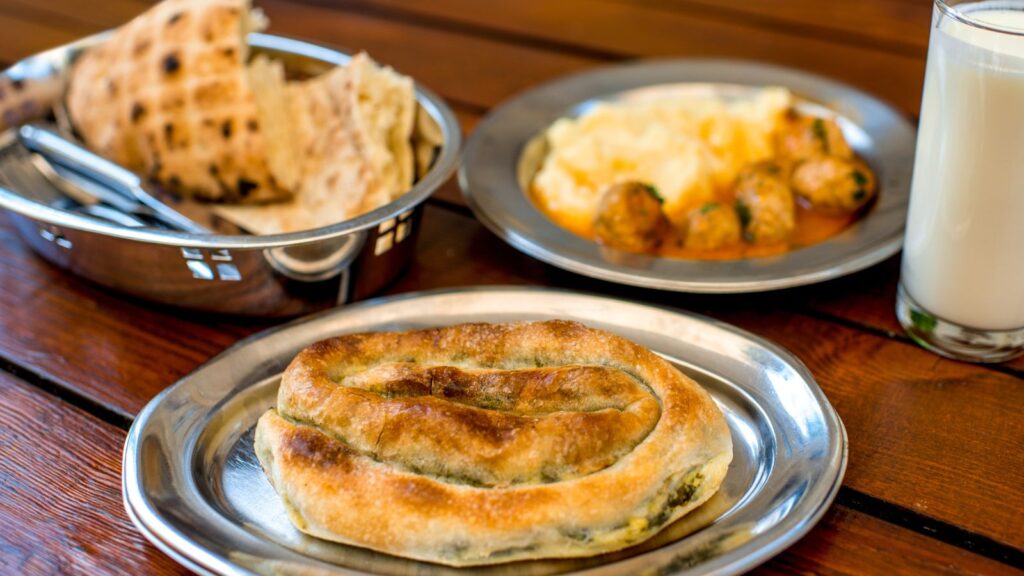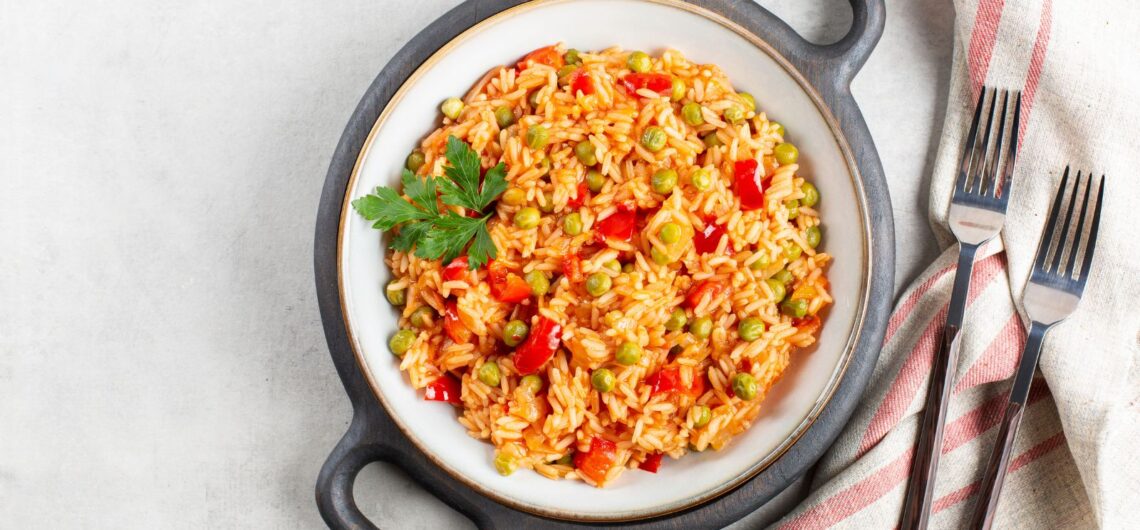Travelling as a vegan or vegetarian in the Balkans might seem like a challenge at first glance–especially if you’ve heard about the region’s big love for meat and dairy. But look beyond the grills and stews, and you’ll find a wealth of naturally vegan dishes, thanks to centuries-old fasting traditions and the region’s rich agricultural heritage.
With Easter approaching and the end of a major fasting period for our Orthodox Christian and Catholic friends, it’s the perfect time to talk about plant-based eating in the Balkans (enter: posno).
This handy guide will help you explore vegan, vegetarian, and dairy and gluten-free foods available in Croatia, Montenegro, Bosnia, Serbia and Albania–and learn how to ask for them.
In this post:
- Understanding Posno and why it’s good for vegans
- Vegan & vegetarian-friendly Balkan dishes
- Vegan & vegetarian travel tips for the Balkans
- Can you get gluten-free food in the Balkans?
- How to order vegan, vegetarian, dairy-free and gluten-free meals
- Our vegan guest’s experience
Are the Balkans Vegan-friendly?

We won’t lie, the Balkan countries aren’t the easiest places to navigate dietary requirements and the answer lies in tradition.
The Balkans are mountainous countries where people have historically lived off their livestock in harsh environments with a short growing season. Long winters meant that vegetables and fruits were pickled or preserved with sugar to last through the colder months.
On the coast, seafood has always been a staple, while inland, people relied on what they could catch, grow, or harvest themselves. Hunting remains popular and the connection to a pastoral lifestyle is still strong, which is why plant-based eating is not as common as in other parts of Europe.
But that’s not to say you can’t get along just fine on a plant-based diet.
Related:
- In conversation with Irina Janakievska, author of The Balkan Kitchen
- 10 traditional Balkan foods you have to try when you visit
- How to drink Bosnian coffee the right way
Understanding Posno and why it’s helpful for vegans
The long-standing Orthodox Christian and Catholic tradition of posno food means vegan and vegetarian options are easier to find than you might expect in the Balkans.
Posno is a catch-all phrase for meals free from meat, dairy and eggs which are consumed during fasting periods around Easter and Christmas, and on Fridays for those who observe regularly (our own housekeeper still fasts every week).
So, when in doubt, just use the magic word ‘posno’ when ordering at a restaurant or bakery. But be aware, some posno meals still include fish and seafood, so if you’re vegan, double check it’s completely meat-free and use one of the phrases below to ensure no animal products have slipped in.
Vegan & vegetarian-friendly Balkan dishes
One of the best things about Balkan cuisine is that many traditional dishes are naturally vegan or vegetarian. And with an emphasis on fresh, made-from-scratch cooking, it’s easy for recipes to be adapted if you’re eating at somebody’s home (restaurants less so).
These dishes are widely available in homes and local markets, making them a reliable choice for plant-based travellers.
🥣 Prebranac (“prey-bra-nats”) – Slow-baked Balkan-style beans, packed with flavour
🍲 Pasulj (“pasu-ly-ah”) – A hearty bean stew, perfect for colder days
🥘 Sataraš (“sata-rash”) – A rich and flavourful vegetable stew, similar to ratatouille
🍚 Djuvec (“dew-vech”) – A tasty rice dish cooked with peppers, tomatoes, and herbs
🥧 Pita sa tikvicama (“peeta sa teek-veet-sama”) – A savoury filo pastry filled with butternut squash
🍆 Ajvar (“ay-var”) – A delicious roasted red pepper and aubergine spread, similar to hummus, often served as a side dish
🍽 Dalmatian Stew – A simple yet flavourful dish of broiled blitva (Swiss chard) with garlic, olive oil, and potatoes.

Vegan & vegetarian travel tips for the Balkans
- Look for ‘Posno’ labels – Particularly in ex-Yugoslavian countries like Croatia, Montenegro, Bosnia, and Serbia, posno foods are common in supermarkets and restaurants during religious fasting periods (such as Lent)
- Explore local markets – Fresh produce is abundant and affordable in Balkan markets. Stock up on fruits, nuts, olives, and homemade preserves for easy snacks on the go
- Communicate dietary needs, in advance if possible – English is widely spoken in tourist areas, but learning a few local phrases like “Bez mesa” (without meat) and “Bez mleka” (without milk) can be helpful when ordering food
- Consider self-catering – Larger supermarkets in major cities are well-stocked with plant-based alternatives, including oat and almond milk, tofu, and vegan snacks
- Call ahead for restaurants and check menus online – Many traditional restaurants don’t have dedicated vegan options, but most are happy to adapt dishes if given advance notice. That said, you can almost always find grilled vegetables, simple salads, and Dalmatian stew as a safe choice
- Bring your favourite vegan protein snacks from home – especially if you are travelling to mountainous or more remote areas.
Can you get gluten-free food in the Balkans?

While plant-based options are increasingly available, the Balkans are a bit behind when it comes to gluten-free dining. Here’s are some travel tips if you’re coeliac or gluten intolerant and heading to the region:
- Consider self-catering – Restaurants tend to be limited for gluten-free eaters, so your best bet is to self-cater. Big chains such as Idea, Boli and Konzum have sections dedicated to gluten-free bread, pasta and snacks. Bear in mind if you’re travelling away from the big cities, options become more limited, so best to stock up beforehand
- Corn flour is widely used – Balkan baking often uses corn flour instead of wheat. Look out for proja od kukuruza, a savoury cornbread often served as a side dish or included in the bread basket, as well as corn-based cakes and pastries
- Call restaurants in advance – Many traditional Balkan dishes include bread, pastry, or flour-based ingredients. It’s always best to call ahead or ask about gluten-free options in advance to save going hungry
- Bring your own bread – If you rely on gluten-free bread, carrying your own supply can be a good idea, especially if you’re venturing into the countryside where options are limited
- Stick to naturally gluten-free dishes – It’s always better to be safe than sorry if you’re not sure something is 100% gluten-free. Grilled vegetables, bean stews, fresh salads, and rice-based meals are usually safe bets.
How to order vegan, vegetarian, gluten-free & dairy-free food in the Balkans
Knowing a few key phrases can make ordering food much easier, especially outside major tourist areas. Here are some handy ones to remember if you need to say you’re vegan, vegetarian or lactose intolerant.
🥦 “I am vegan”– “Ja sam vegan” (Serbian/Bosnian/Montenegrin/Croatian) / “Unë jam vegan” (Albanian)
🥕 “I am vegetarian” – “Ja sam vegetarijanac” (male) / “Ja sam vegetarijanka” (female) / “Unë jam vegjetarian” (Albanian)
🚫 “No meat, please” – “Bez mesa, molim” (Serbian/Bosnian/Montenegrin/Croatian) / “Pa mish, ju lutem” (Albanian)
🐟 “No fish, please” – “Bez ribe, molim” (Serbian/Bosnian/Montenegrin/Croatian) / “Pa peshk, ju lutem” (Albanian)
🥛 “No milk/dairy, please” – “Bez mleka/mleka, molim” (Serbian/Bosnian/Montenegrin/Croatian) / “Pa qumësht, ju lutem” (Albanian)
🍳 “No eggs, please” – “Bez jaja, molim” (Serbian/Bosnian/Montenegrin/Croatian) / “Pa vezë, ju lutem” (Albanian)
🌾 “No gluten, please” – “Bez glutena, molim” (Serbian/Bosnian/Montenegrin/Croatian) / “Pa gluten, ju lutem” (Albanian)
🌱 “Is this dish vegan?” – “Da li je ovo vegansko?” (Serbian/Bosnian/Montenegrin/Croatian) / “A është kjo vegane?” (Albanian).
A Vegan Guest’s Experience at Lake Skadar
Many of our guests are vegan or prefer to eat more plant-based foods, and we love catering for them. In fact, our 2023 guest Daniella left this glowing review of her experience on our Lake Skadar holiday in Montenegro:
“We had told Ben that we are both vegan before we arrived. I was a bit concerned about this before we arrived as I’m aware that Montenegro is not a vegan-friendly country, however, we were very pleasantly surprised. Ben made us plenty of delicious vegan dishes on the welcome dinner – the homemade black mulberry ice cream was excellent! All of the lunches that were included were also able to cater to us, and we ate very well all in all. Lunch at Tanja’s (a local lady and friend of Ben and Emma) was a highlight as she made so many delicious vegan dishes for us to indulge in, most of them from vegetables and fruits grown in her garden. Ben and Emma even sourced some vegan birthday cake on my husband’s birthday!”
Looking for a holiday that caters to your dietary needs while offering unforgettable adventure and cultural experiences? Join us at Undiscovered Balkans and discover a whole new side to Balkan cuisine.


Comments